Resources
19 March 2023
6:30pm
Easter in Isaiah
Father,As we look into your written Word at what your Son Jesus did for us on the cross, and as we dwell on it later in communion, please pour out a sense of your love into our hearts. In Jesus’ name, Amen
Please have a seat. And let me ask: What do you most associate with Easter? That was a question in a recent YouGov poll and the top answer, unsurprisingly, was Easter Eggs followed by Bank Holidays, Hot cross buns, and Jesus coming in fourth. Which is a reminder that, with Easter coming, we mustn’t take for granted that we know what Easter’s about. So let me say straight out: it’s about Jesus’ death and resurrection and what they mean for us. And we’re doing a mini-series on that starting tonight, and I wonder what bit of the Bible you’d have chosen for that? I guess the most obvious candidate would be the end of one of the four Gospels – the eye-witness, historical record of what actually happened. The next most obvious candidate might be an Eastery bit of one of the New Testament letters – like 1 Corinthians 15. But we’re actually going to jump back into the Old Testament (the part of the Bible written before Jesus but pointing forward to Jesus) and into the book of the prophet Isaiah. He lived 700 years before Jesus and yet Isaiah 53 is one of the most important chapters in the whole Bible about Jesus’ death and resurrection. So would you turn in the Bibles to page 613, as we start to look at Easter in Isaiah. And let me give you the background in pictures:
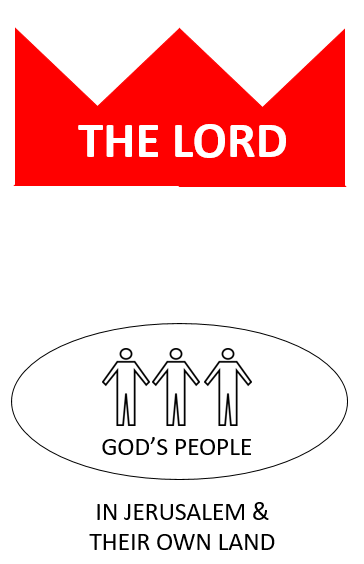
So there are God’s Old Testament people, Israel – who were meant to live under God’s rule, under that crown that stands for God, or the LORD as he’s called in the Old Testament.
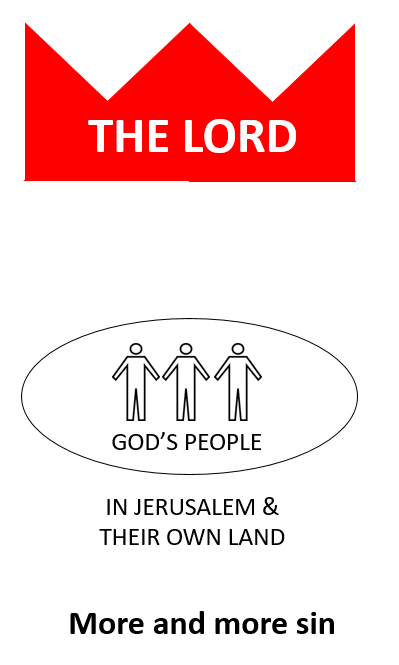
But next picture: the story of Israel was of less and less living under God’s rule, and more and more sin.
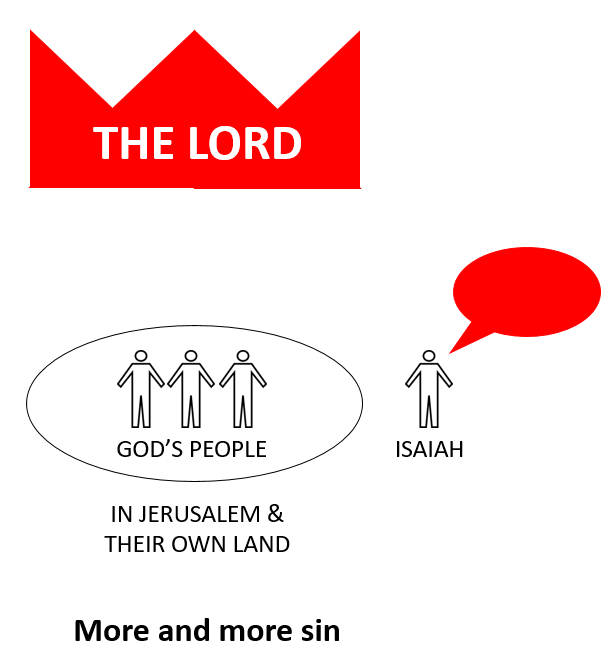
And into that situation, God sent his prophets, like Isaiah, and their job was to speak God’s Word to his people.
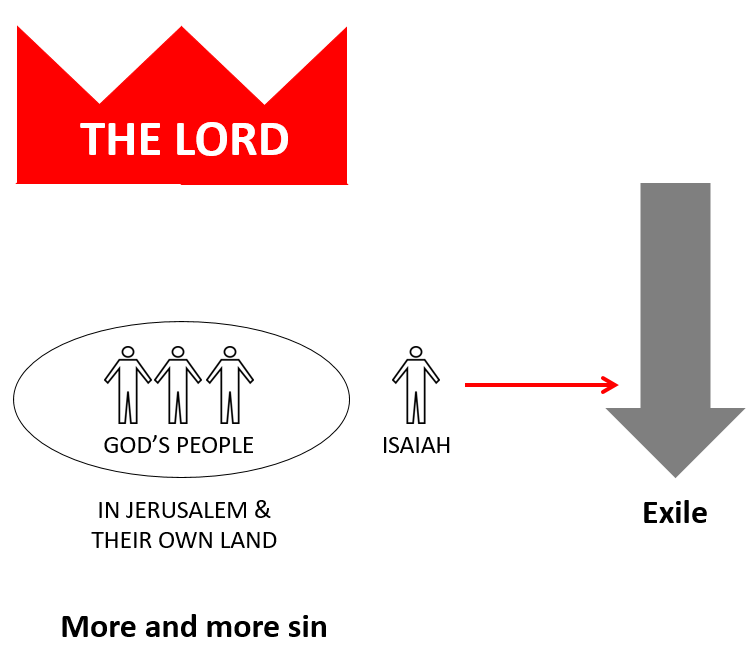
And the book of Isaiah is like one of those weather websites where you can get short, medium and long term forecasts, because in the short term, God said through Isaiah that if his people carried on as they were, his judgement would fall and he’d allow them to be sent into exile, and lose Jerusalem and their country. And God knew that’s how it would pan out.
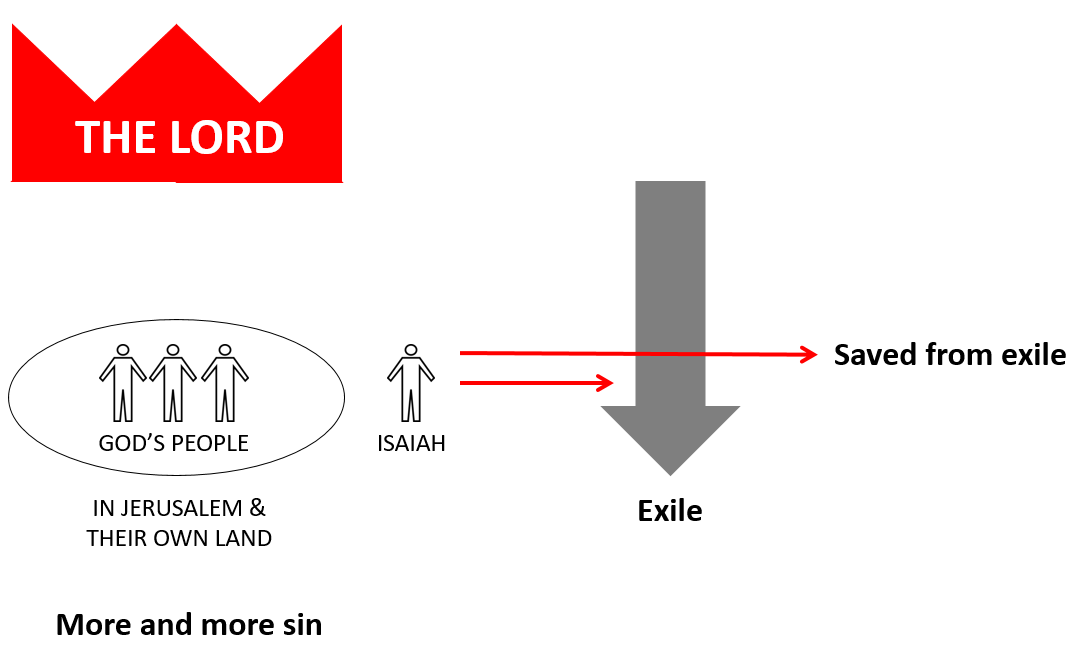
So, next picture, God also gave Isaiah the medium term forecast. Which was his promise that that judgement would not mean the end of his commitment to them, but that he would save them from exile and bring them back to Jerusalem and their country. But that of course wouldn’t solve the biggest problem in that picture – which is? Sin. And God’s big purpose in choosing Israel in the first place, and rescuing them from Egypt, and offering them relationship with him, and giving them his law to live under was to show up the problem of sin. Because, despite all those privileges, they simply sinned more and more, which showed up what we’re all like by nature. Namely rebellious and wanting to rule our own lives rather than have God rule them.
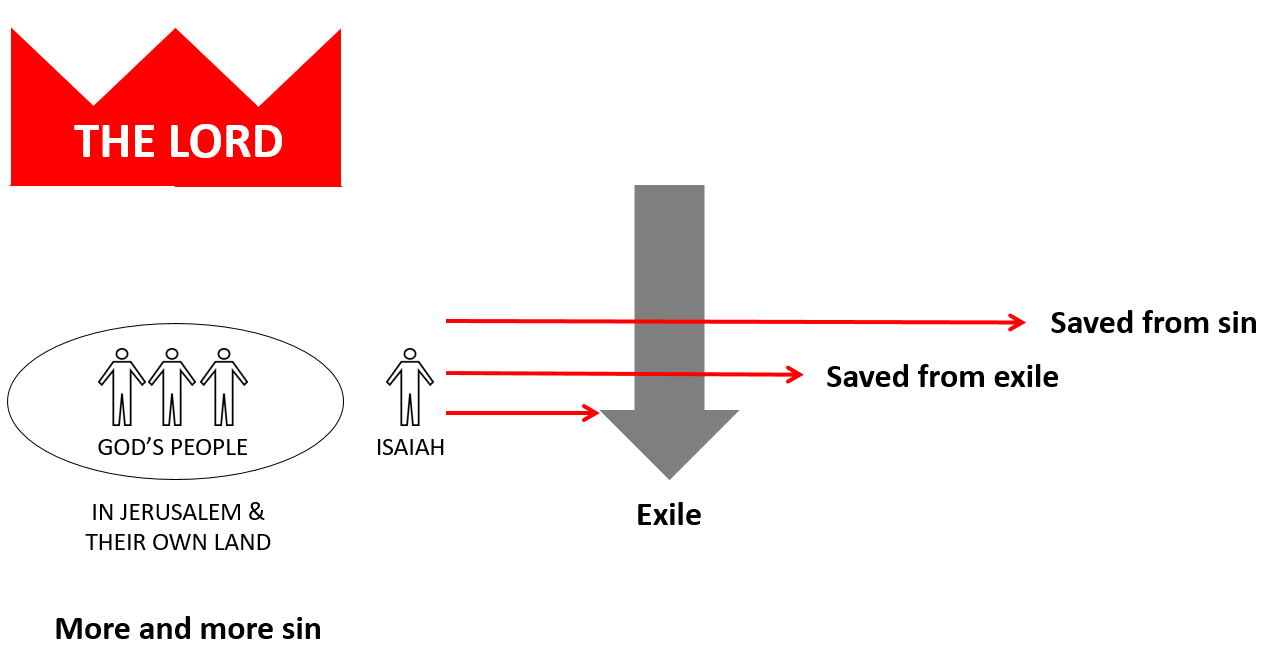
And so the next picture shows the long term forecast that God gave Isaiah – which was that he would act not just to save Israel from exile, but to save people of all nations, including Israel, from sin. So on page 613, look down to Isaiah 52.9 – top of the right hand column. And you need to know: Isaiah wrote this before the exile, as a message for those who’d be alive after the exile. And he wrote it in the past tense – as if to say ‘It’s so sure that God will make this happen that I’m writing as if he already has.’ Isaiah 52.9:
Break forth together into singing,you waste places of Jerusalem,for the Lord has comforted his people;he has redeemed Jerusalem.
So there’s the message to God’s exiled people – ‘I’m going to save you from exile and from your sin.’ But it’s bigger than just Israel, Isaiah 52.10:
The Lord has bared his holy armbefore the eyes of all the nations,and all the ends of the earth shall seethe salvation of our God.
So that’s the picture of what you do before getting to work on the washing up, or some DIY. You roll up your sleeves. You bare your arm. And Isaiah is saying the LORD is going to roll up his sleeve and reach down with his arm to save people of all nations from sin, from their broken relationship with him. And that brings us to Isaiah 53. And on the Thursday night before the Good Friday on which he died, Jesus quoted this chapter and said (Luke 22.37):
For I tell you that this Scripture must be fulfilled in me
So look down to Isaiah 52.13, which is where this section really begins. And God says through Isaiah:
Behold, my servant
And this is one of four sections in Isaiah about this figure the servant. And in cinema terms, they’re like trailers for what Jesus came to do, because he is the servant being described here. This section in Isaiah 52-53 is a five-part poem. It tells the story of Jesus’ whole mission from birth to resurrection. We’re just doing two parts tonight, and the first part says that the servant’s mission is going to be the story of:
1. Unexpected suffering leading to glory
Look down again to Isaiah 52.13. God says:
Behold, my servant shall act wisely [Other translations say ‘prosper’ or ‘succeed’ – the idea is that he’s wise enough to pull off the mission he’s come on] he shall be high and lifted up, and shall be exalted.
And Isaiah only ever uses that kind of language to describe God himself on his throne, in his glory. For example, in a vision of God earlier in the book, Isaiah says (Isaiah 6.1):
I saw the LORD sitting upon a throne, high and lifted up
Same words. So in this opening verse, God is saying: ‘My servant is going to succeed in his mission and end up sharing my throne and my glory.’ And that sounds about what you’d expect. After all, God doesn’t fail. And, from the New Testament, we know that God is more than one person – so the hint here that the servant is a distinct person and yet fully God also makes sense. But the next verse is then totally unexpected (Isaiah 52.14):
As many were astonished at you –[a better translation would be ‘appalled’]his appearance was so marred, beyond human semblance,and his form beyond that of the children of mankind–
So the totally unexpected thing is that the servant’s route to a successful mission and to sharing God’s throne and glory is appalling suffering. Isaiah originally wrote this in Hebrew, and the Hebrew boffins disagree about exactly how to translate this verse. But they do agree that it’s talking about some kind of suffering that’s worse than any other human being has ever experienced; uniquely awful suffering – that will leave many appalled. How could God allow his servant to suffer like that? What purpose could that possibly serve?
I remember one international student in a Christianity Explored course. She was from China, and she was loving getting her first ever look at Jesus, and loving what she saw of his love and his compassion and his healings and his forgiveness of failures like us. And then we came to the week on the cross, and she was in tears because (unlike the rest of us) she came to it as someone who didn’t know that was coming, and she was appalled. It was unthinkable to her. And it was unthinkable to the apostle Peter when in Mark’s Gospel we read that (Mark 8.31-32):
[Jesus] began to teach them that the Son of Man [that’s Jesus himself] must suffer many things and be rejected by the elders and the chief priests and the scribes and be killed, and after three days rise again. And he said this plainly. And Peter took him aside and began to rebuke him.
Because he hadn’t understood that word must. Because it is the word Jesus used for what must happen as part of God’s plan. And Jesus knew it must because of ‘trailers’ like Isaiah 53. But Peter didn’t see that. He was expecting a powerful Messiah, not a suffering servant. Which is why, after Jesus died and rose again, he explained what Peter and the others should have been expecting. (Luke 24.25-26):
And [Jesus] said to them, “O foolish ones, and slow of heart to believe all that the prophets have spoken! Was it not necessary [that’s literally the same ‘must’ word – wasn’t it a must] that the Christ should suffer these things and [then] enter into his glory?”
So they needed to see that what had seemed totally unexpected and appalling was in fact part of God’s plan, as ‘trailed’ by the Old Testament prophets. And one lesson for us is that if something as appalling as the cross was part of God’s plan, allowed for God’s purposes, then we can trust that the worst things that happen to us and around us are also somehow part of God’s plan, allowed for his purposes. That doesn’t mean we’ll have the comfort of understanding why they’re allowed – very often we don’t. But it does mean we have the comfort of knowing that God hasn’t lost control or lost interest – that those worst things didn’t just happen because he couldn’t help it or doesn’t care. Well, back to Isaiah 52.14:
As many were [appalled] at you—his appearance was so marred, beyond human semblance,and his form beyond that of the children of mankind –
So the many are appalled at the servant’s suffering and left asking ‘How could God allow his servant to suffer like that? What purpose could that possibly serve?’ And the answer is in Isaiah 52.15:
so shall he sprinkle many nations
So the purpose of what appals many is that it will sprinkle many. And most of us are drawing a blank at that point. Whereas Old Testament believers like Isaiah would immediately have spotted that sprinkle was a word lifted from the sacrificial system – where the priests would sacrifice an animal to symbolise that forgiveness must be paid for, and then they’d sprinkle some of its blood on you to symbolise that forgiveness had been given. And the purpose of the servant’s suffering was to be the sacrifice that would really pay for sins – which all those animal sacrifices could only point to. Which is why, in communion, we use that prayer about the cross which says:
Jesus…made there a full atonement for the sins of the whole world, offering once for all his one sacrifice of himself
So until they understand the servant’s suffering, some people are appalled. While some others in Isaiah 52.15 are struck dumb:
kings shall shut their mouths because of him;for that which has not been told them they see,and that which they have not heard they understand.
Because this servant figure is actually the Messiah or Christ – the king figure promised by God to bring people back into God’s kingdom, back under God’s rule. And Isaiah pictures the kings of the earth struck dumb by the completely unexpected route this king takes to doing that. Because if it was them wanting to extend their rule over the nations, they’d take the Vladimir Putin Correspondence Course, and go the route of power and force and making people submit, like it or not. That’s how kings operate isn’t it? Whereas God’s King (ie, the Messiah, the Christ) goes the unexpected route of the suffering servant, of apparent weakness and failure So that the kings in Isaiah 52.15 are left saying:
[Well, that’s a new one on me!] for that which has not been told them they see, and that which they have not heard they understand.
In other words, ‘I’ve never heard of a kingdom like this before – where the King willingly suffers and dies to make people his people. What kind of a kingdom is that?!’ And the answer is: a kingdom of the willing and the grateful. A kingdom of people who don’t say ‘Well, I guess I have to serve Jesus,’ but who say, ‘I want to serve Jesus after the way he’s served me.’ A kingdom of people who don’t say ‘Well, I guess I’ve got to live this way,’ but who say, ‘Hey, I get to live this way. I get to live a new forgiven life thanks to Jesus dying for me.’ Does that describe you this evening? If so, you’ll be able to say that prayer after communion and mean it:
We thank you for feeding us with the body and blood of your Son Jesus Christ. Through him we offer you our souls and bodies to be a living sacrifice.
So that’s the first part of this poem. The servant’s mission is going to be the story of; Unexpected suffering leading to glory. And the other part tonight says that it’s also going to be the story of:
2. Unrecognised Godhead leading to rejection
So next, Isaiah imagines that this servant figure has come, and the message about him is being preached. And look at Isaiah 53.1:
Who has believed what he has heard from us?And to whom has the arm of the Lord been revealed?
And the implication: is that no-one will believe unless God reveals to people who his servant is. So God knows that this servant figure is the arm of the LORD – part of the Godhead and yet somehow a distinct person. but no-one else knows that. In Isaiah’s vision here, people who see him and hear him don’t know that – because the servant becomes a human being, because it’s a ‘must’ of his mission to die in our place. And so it’s possible to think that he’s just a human being and nothing more. Look on to 53.2-3:
For he [that’s the servant, the arm of the LORD] grew up before him [that’s the LORD] like a young plant,and like a root out of dry ground;he had no form or majesty that we should look at him,and no beauty that we should desire him.He was despised and rejected by men;a man of sorrows, and acquainted with grief;and as one from whom men hide their faceshe was despised, and we esteemed him not.
In other words, we didn’t think he was who he really was. And isn’t that what you see happening as you read through the Gospels? People failing to see who Jesus really is. People saying ‘He’s just a man and nothing more.’ Because, as 53.2 says he had no form or majesty that we should look at him. So it was not obvious that he was a king, by the world’s standards. After all, he was born in an animal shed and brought up as a carpenter. And it was not obvious that he was part of the Godhead. I know the old Renaissance paintings of him have the dinner plate behind his head and the glow around his clothes, but it wasn’t like that. People just didn’t see who he really was.
So it’s no wonder that John, in his Gospel, sums up Jesus’ ministry like this (John 12.37-38):
Though he had done so many signs before them, they still did not believe in him, so that the word spoken by the prophet Isaiah might be fulfilled [And here’s Isaiah 53.1:] “Lord, who has believed what he heard from us, and to whom has the arm of the Lord been revealed?”
And the implication is that no-one will recognise who Jesus really is unless God reveals it to them. And the reason is that by nature we’re all spiritually blind. And it’s a wilful blindness. It’s the kind of blindness we apply to 30mph signs when we’re in a hurry, or that our children apply to little notes we leave them saying, ‘Please empty the dishwasher’ or feed the dog. It’s blindness that doesn’t actually want to see. Because recognising Jesus for who he really is spells the end of ruling our own lives – which brings us full circle back to the problem of sin. Because the problem of sin is that by nature I don’t want Jesus ruling my life, I don’t want to recognise him for who he is. And Isaiah 53.1 is saying that I only will if God works in me by his Spirit to reveal who Jesus is and to show me that he’s good news for my life, and not bad.
So, if to be honest you don’t yet see who Jesus is, or what the cross has to do with you, can I encourage you to keep coming, to keep looking into the Bible with us, maybe to join our next Christianity Explored. But can I also encourage you to start praying that God would work in you to help you understand Jesus and why you need what he did for you on the cross. That would be a great prayer to start praying. And if you do see who Jesus is, can I encourage you not to think that it’s because you’re smarter than others, and worked it out. If you see who Jesus is and why he died, and you’re trusting in him today, it’s only because God worked in you by his Spirit to get you there. And the only appropriate response to that is humility and praise. But for tonight, let’s end where we began with Isaiah 53.13:
Behold, my servant shall act wisely;he shall be high and lifted up,and shall be exalted.
And having died for our forgiveness, that’s where Jesus is – sharing his Father’s throne and glory. And thanks to what he’s done for us, we can dare to sing words like this:
Boldly I approach your throneBlameless now I'm running homeBy your blood I comeWelcomed as your ownInto the arms of majesty[Boldly I Approach, Rend Collective © 2014 Thankyou Music,admin worldwide Capitol CMGPublishing.com]
